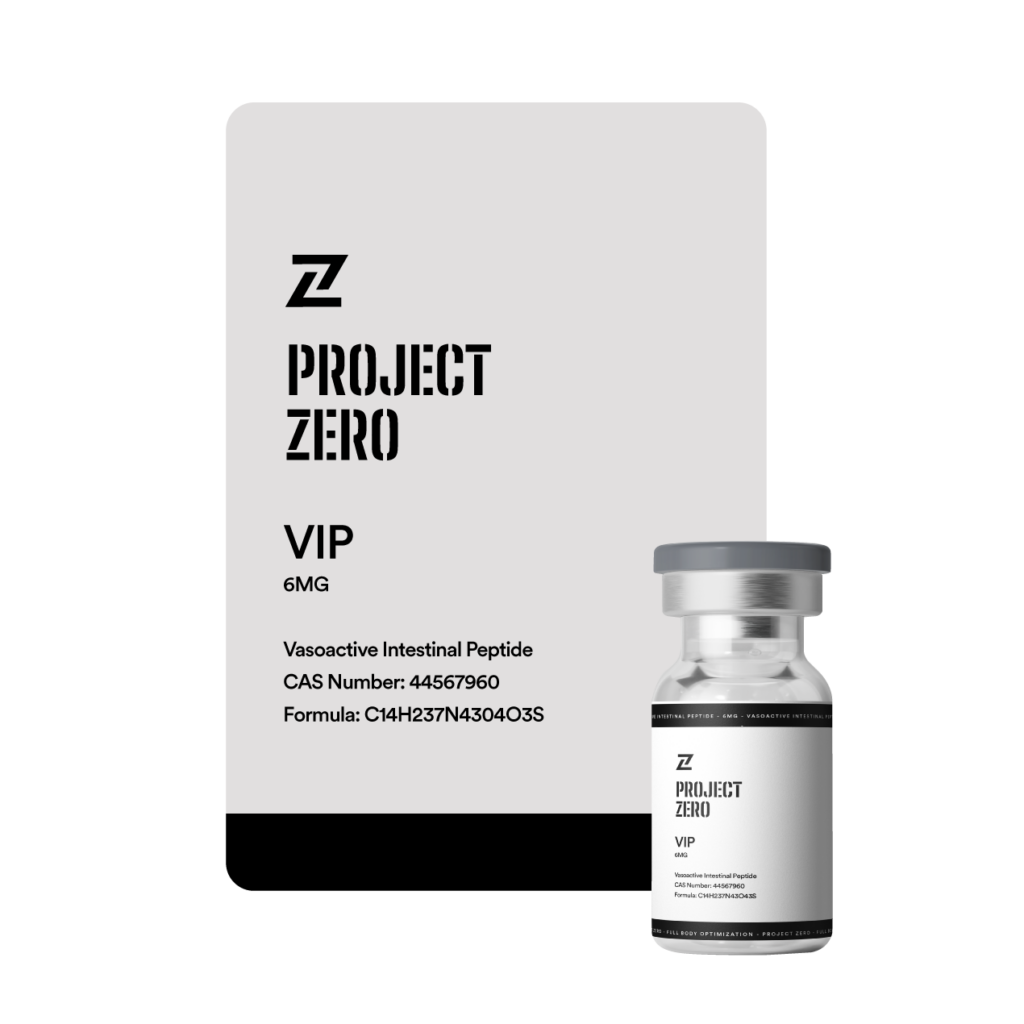VIP:
Dosage, Benefits,
and Research Explained
GLP-1 Analogue
CAS Number: 40077-57-4
Formula: C147H238N44O42S
| Purpose | Dosage | Frequency |
|---|---|---|
| Neuroprotection | .1-1mg daily | Once daily |
| Immune Modulation | .1-1mg daily | Once daily |
How It Works
VIP functions by binding to specific G-protein-coupled receptors (VPAC1 and VPAC2), triggering a cascade of cellular responses:
- Promotes vasodilation, improving blood flow
- Enhances neuroprotection by supporting neuronal survival
- Modulates immune responses, reducing inflammation
Its broad activity across the nervous, cardiovascular, and immune systems positions VIP as a versatile peptide for research exploration.
Clinical Benefits
Vasodilation Support
- Increases blood vessel relaxation, potentially aiding circulation
- May assist in managing conditions linked to poor blood flow
Neuroprotection
- Protects neurons from damage in preclinical models
- Shows promise for neurodegenerative disease research
Immune Regulation
- Reduces pro-inflammatory cytokines, balancing immune activity
- Potential benefits in autoimmune and inflammatory conditions
Gastrointestinal Health
- Supports smooth muscle relaxation in the gut
- May improve digestive function and motility
Stress Response
- Linked to calming effects via hypothalamic regulation
- Could influence stress-related pathways
Dosage & Administration
- Starting dose: 0.1 mg daily
- Maintenance dose: Adjusted up to 1 mg daily, based on research protocols
- Administration: Typically via subcutaneous injection or nasal spray
Always follow research guidelines or medical advice for dosing adjustments.
Where to Buy VIP
Looking for high-quality VIP for research purposes? Purchase from our preferred vendor: Click Here to Buy VIP
Ongoing Research
- Neurological Studies: Investigating VIP’s role in Alzheimer’s and Parkinson’s models
- Cardiovascular Potential: Exploring benefits for hypertension and heart function
- Immune Applications: Researching effects on chronic inflammation and autoimmunity
- Long-Term Safety: Assessing prolonged use in various models
- Delivery Optimization: Testing nasal vs. injectable administration efficacy
What is VIP (Vasoactive Intestinal Peptide) and How Does It Function?
VIP is a naturally occurring peptide hormone composed of 28 amino acids, found in various tissues including the gut, pancreas, and brain. It plays a crucial role in regulating smooth muscle activity, promoting vasodilation, stimulating secretion of water and electrolytes in the intestines, and modulating immune responses. VIP’s diverse functions make it significant in maintaining homeostasis across multiple organ systems.
What Are the Potential Health Benefits of VIP Therapy?
VIP therapy has been explored for its potential benefits in various health conditions:
Anti-Inflammatory Effects: VIP has shown promise in reducing inflammation, which may benefit individuals with autoimmune diseases and inflammatory conditions.
Respiratory Health: Due to its bronchodilatory properties, VIP may aid in managing respiratory conditions like asthma and chronic obstructive pulmonary disease (COPD).
Cardiovascular Support: VIP can induce vasodilation, potentially lowering blood pressure and improving blood flow, which may support heart health.
Neurological Benefits: VIP’s presence in the brain suggests it may play a role in neuroprotection and cognitive function, although more research is needed in this area.
How Is VIP Administered and What Are the Recommended Dosages?
VIP is commonly administered through subcutaneous injections or nasal sprays. The specific dosage and administration frequency depend on the individual’s health status and the condition being treated. It’s essential to follow a healthcare provider’s guidance for appropriate dosing.
Are There Any Side Effects or Precautions Associated with VIP Therapy?
While VIP therapy is generally well-tolerated, some individuals may experience side effects such as:
Flushing or Warm Sensations: A feeling of warmth or redness in the skin.
Headaches: Mild to moderate headaches may occur.
Dizziness: Some users report lightheadedness.
Heart Palpitations: An awareness of heartbeats or irregular heart rhythms.
Due to its vasodilatory effects, VIP can lower blood pressure; therefore, individuals with hypotension or cardiovascular concerns should consult their healthcare provider before starting therapy.
Referenced Citations
Bains, M., et al. (2019). Vasoactive Intestinal Peptide Deficiency Is Associated with Altered Gut Microbiota Communities in Male and Female C57BL/6 Mice. Frontiers in Microbiology, 10, 2689. https://doi.org/10.3389/fmicb.2019.02689
Wikipedia Contributors. (2019, October 22). Vasoactive Intestinal Peptide. Wikipedia. Retrieved from https://en.wikipedia.org/wiki/Vasoactive_intestinal_peptide
The Pancreapedia. (2015). Regulation of Pancreatic Secretion. The Pancreapedia: Exocrine Pancreas Knowledge Base. https://www.pancreapedia.org/reviews/regulation-of-pancreatic-secretion
Riepl, R. L., et al. (1994). Effect of Intraduodenal Bile and Taurodeoxycholate on Exocrine Pancreatic Secretion and on Plasma Levels of Vasoactive Intestinal Polypeptide and Somatostatin in Man. Pancreas, 9(1), 109–116. https://doi.org/10.1097/00006676-199401000-00016
